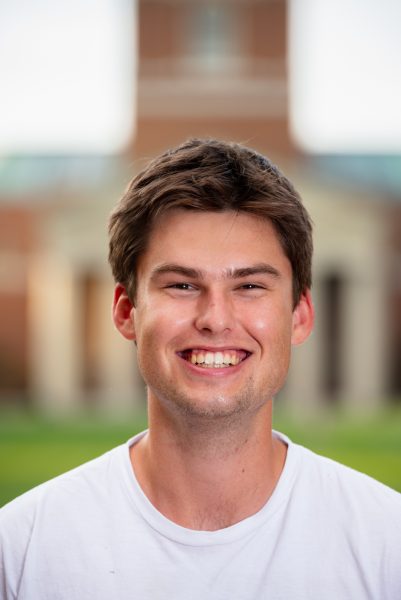Julianne Zhu – Musical Performance
May 7, 2021
When the clock strikes 5 p.m., the Wait Chapel bells begin their brief but beautiful song. These aren’t the only instances of music coming down from above — choir concerts, guest performers and symphony orchestras have all graced the stone stage, as has senior Julianne Zhu.
“I’ve always wanted to major in music,” Zhu said. “Even before I came to Wake Forest I knew I was going to major in music. At that time, I wanted to be a singer. But, when I got to Wake Forest and I saw the organ in Wait Chapel, and I thought, ‘I want to play that.’”
Having only played piano for a few years as a kid in Shanghai, China, Zhu was determined to master the giant instrument. During her sophomore year, Zhu decided to make organ, not voice, the concentration of her Music Performance degree.
This past September, Zhu was able to perform, albeit virtually, her senior recital on the Wait Chapel organ. She played pieces from Bach (her favorite composer), Buxtehude, Eben, Franch, Boellmann and Wake Forest’s own composer in residence, Dr. Dan Locklair. Zhu has also written her own short two-to-three-minute compositions on the piano for her music theory class, and she is aiming to write longer organ compositions in the future.
“I would also like to know how to improvise,” Zhu said. “Because that’s a really important skill for any organist, and I just have no idea how to do it. My teacher [adjunct faculty member Susan Bates] can just sit on the organ and play some amazing music. And she’s like, ‘Oh, I just made it up.’ So, I really want to learn how to do that.”
The organ has not received all of Zhu’s musical attention — she has also learned the viola da gamba, a Baroque-Renaissance style string instrument played similarly to the cello, for the Collegium Musicum, an ensemble she has been involved with since freshman year.
Zhu also made sure not to neglect her initial musical love: singing. A video recently posted to the Wake Forest Music department’s Instagram page shows the Bach enthusiast performing Mozart’s “Ah perdona al primo” in Italian.
Zhu’s artistic attentions are not confined to music, however. As a member of the Ballroom Dancing Club, one of her fondest memories at Wake Forest was being a part of a theatre student’s honor project, which combined different styles of dance into one performance.
“I got to do the polka and wear the giant dress,” she recalled. “That was really fun.”
As graduation quickly approaches, Zhu can’t think of anything that she would change about the past four years. Adamantly, she believes she has “made the most out of college.”
“I don’t feel like a senior,” Zhu said. “I feel like this past year, because of COVID, I didn’t really have that year, and it feels like I had [only] three years here. I’m not ready to graduate.”
But Zhu won’t be going far following graduation. Next year, she will be attending the UNC School of the Arts (UNCSA) in downtown Winston-Salem for a two-year graduate program. After that, the possibilities are endless.
“I am thinking about going to Europe to find other graduate schools [where I can] continue playing. For music, you can really do anything with a bachelor’s degree,” Zhu said laughingly.
Zhu credits Dr. Stewart Carter, her Collegium Musicum conductor and a professor of music history, as the instructor that helped and inspired her the most over the past four years. As for her advice for others thinking they may want to major in music performance as well,” Zhu explained the importance of remaining flexible and open to change.
“I’d say ‘keep your mind open.’ Like I said, when I came here, I wanted to major in voice and I ended up doing organ. Take two or three music classes before you decide what you really want to major in. I know a lot of people struggle in music theory, and when they attend that class they weren’t expecting that kind of difficulty. I would also say, take at least one theory class before you decide your major.”













